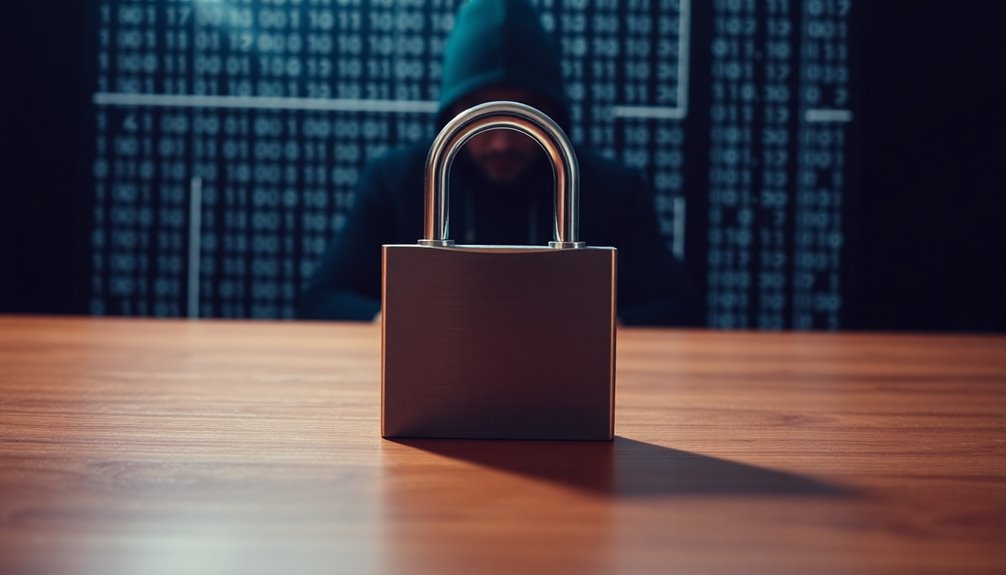A zero-knowledge proof (ZKP) is a cryptographic technique that lets you confirm knowledge of a fact without revealing any underlying details. Think of it as proving someone's age without disclosing their exact birth date. ZKPs have three essential properties: completeness, soundness, and, crucially, zero-knowledge, meaning the verifier gains no extra information. You can engage in either interactive or non-interactive proofs, depending on how many rounds of communication are needed. This method enhances privacy and security in various digital contexts, from cryptocurrencies to secure authentication. Stick around to explore its applications and advantages further!
Key Takeaways
- Zero-Knowledge Proofs (ZKPs) allow one party to prove knowledge of a statement without revealing the statement itself.
- ZKPs satisfy three core properties: completeness, soundness, and zero-knowledge.
- There are two main types of ZKPs: interactive (multiple messages exchanged) and non-interactive (single message).
- They enhance privacy in digital communications, especially in cryptocurrencies and secure authentication.
- ZKPs have applications in decentralized identity, smart contracts, and privacy-preserving transactions.
Core Principles of ZKPS

Zero-knowledge proofs (ZKPs) fundamentally rely on three core principles that ensure their effectiveness in secure communication.
First is completeness, where an honest prover can convince an honest verifier of the truth of a statement.
Next is soundness, which guarantees that no cheating prover can persuade the verifier of a false statement with high probability.
Finally, zero-knowledge ensures the verifier gains no additional information beyond the truth of the claim.
ZKPs can be categorized into interactive proofs, requiring multiple communication rounds, or non-interactive proofs, involving a single verification message.
These principles lay the groundwork for robust cryptographic security, allowing secure exchanges without revealing sensitive information, making them vital in modern digital communications.
Overview of Zero-Knowledge Proofs

When you want to prove knowledge of a statement without revealing any details, zero-knowledge proofs (ZKPs) come into play.
These cryptographic methods allow a prover to demonstrate knowledge to a verifier while ensuring that no extra information is disclosed. ZKPs must satisfy three properties: completeness, ensuring an honest prover convinces an honest verifier; soundness, preventing a dishonest prover from deceiving the verifier; and zero-knowledge, where the verifier learns nothing beyond the truth.
There are two main types of ZKPs: interactive proofs, which involve multiple communication rounds, and non-interactive proofs, requiring just one message.
ZKPs significantly enhance privacy and security in various applications, including cryptocurrencies and secure authentication processes.
Interactive Proof Systems Explained

Interactive proof systems create a dynamic dialogue between a prover and a verifier, allowing the prover to demonstrate the truth of a statement through a series of exchanged messages.
These systems are built on the principles of completeness and soundness, ensuring that if the statement is true, the verifier will be convinced without revealing more than necessary—this is where zero-knowledge comes in.
The prover's ability to adapt their strategy is crucial, as the verifier can ask multiple questions to test the proof of knowledge.
Interactive zero-knowledge proofs enhance secure communications, serving as essential cryptographic protocols.
While some interactive proof systems require just a few rounds of communication, others may involve many interactions to achieve the desired level of assurance.
Pros and Cons Overview

Proving knowledge without revealing details offers significant advantages and challenges in digital communications. Zero-knowledge proofs (ZKPs) enhance privacy by allowing a party to verify a statement's truth without disclosing the statement itself. This is crucial for secure authentication in cryptocurrencies and sensitive transactions.
However, the complexity of implementing ZKPs can be resource-intensive, which may limit their applicability in smaller systems. Additionally, interactive proofs often require multiple communication rounds, potentially leading to latency and inefficiency in real-time applications.
Fortunately, advancements like zk-SNARKs and zk-STARKs improve scalability and efficiency, making it easier to integrate ZKPs into large-scale systems like blockchain technology. Balancing these pros and cons is essential for optimizing the use of ZKPs in various digital environments.
ZKPS Versus Traditional Proofs

While traditional proofs often involve sharing sensitive information, zero-knowledge proofs (ZKPs) offer a more secure alternative by allowing a prover to convince a verifier of a statement's truth without disclosing any details.
In traditional proofs, the verifier gains knowledge beyond just the truth, compromising the prover's privacy. ZKPs maintain this privacy by ensuring the verifier learns nothing beyond the validity of the statement.
Unlike traditional systems, which typically require a single exchange of information, ZKPs can be interactive or non-interactive, providing flexibility.
Additionally, the soundness property in ZKPs guarantees that a dishonest prover can't convince a verifier of a false statement, a feature that may not be reliably enforced in all traditional proof systems.
Security Vulnerabilities in Implementation

As zero-knowledge proofs gain traction in various applications, it's crucial to recognize that their implementation isn't immune to security vulnerabilities.
Improper parameter generation can create weaknesses that attackers might exploit, leading to unauthorized access. Additionally, side-channel attacks during execution can reveal sensitive information through timing, power consumption, or electromagnetic leaks.
Insufficient randomness in non-interactive zero-knowledge proofs may produce predictable outputs, making them vulnerable to forgery or impersonation attacks. Using outdated cryptographic primitives can expose systems to known vulnerabilities, highlighting the need for regular updates.
Finally, mismanagement of secret keys during setup can cause key exposure, further undermining the security guarantees that zero-knowledge proofs are meant to provide.
Understanding these vulnerabilities is vital for secure implementation.
Emerging Zk-Snark Applications

Emerging applications of zk-SNARKs are revolutionizing how we approach privacy and security in digital environments.
These zero-knowledge proofs enable privacy-preserving applications within blockchain technology, allowing for shielded transactions that protect user data while maintaining integrity.
You'll find zk-SNARKs adopted widely in cryptocurrencies like Zcash, ensuring anonymity without compromising security.
Beyond finance, they're transforming decentralized identity systems by enabling users to prove attributes, such as age, without revealing sensitive information.
Additionally, integrating zk-SNARKs into smart contracts allows for private computations and secure verification processes.
This fosters trust in decentralized applications across various sectors, including finance and supply chain management, paving the way for a more secure digital future where privacy and transparency coexist.
Optimize for Computational Efficiency

The advancements in zk-SNARKs not only enhance privacy but also open up avenues for optimizing computational efficiency in zero-knowledge proofs (ZKPs).
By utilizing succinct proof systems like zk-SNARKs, you can generate short proofs that are quick to verify, significantly reducing processing time.
Implementing batching techniques allows you to prove multiple statements simultaneously, minimizing redundant computations.
To further boost efficiency, consider parallel processing, which distributes the computational load across multiple processors, speeding up proof generation and verification.
Additionally, zk-STARKs eliminate the need for a trusted setup, streamlining ZKP processes.
Advanced techniques like recursive proofs let you nest ZKPs, enabling smaller proofs to validate larger computations without sacrificing efficiency or increasing verification time.
Frequently Asked Questions
What Is a Zero-Knowledge Proof?
You might wonder how someone can prove they know something without actually sharing that information.
Imagine a scenario where you can convince someone you hold a secret without ever revealing it. This concept revolves around demonstrating knowledge while keeping the details hidden.
It involves specific properties ensuring that if the claim is true, the other person believes you, and if it's false, they can't be fooled.
It's a fascinating intersection of trust and privacy!
What Is a Real Life Example of Zero-Knowledge Proof?
A real-life example of zero-knowledge proof is when you want to convince a friend you know a secret without revealing it.
Imagine you're in a cave with two paths. You enter one path and emerge at a door. Your friend, waiting outside, can't see which path you took but believes you know how to access the door.
This scenario shows how you can prove knowledge without sharing the secret itself.
What Is the Zero-Knowledge Proof Principle?
You'll find that the zero-knowledge proof principle enables one party to prove knowledge of a secret without disclosing any details about it.
This concept hinges on three core properties: completeness, ensuring an honest prover can convince the verifier; soundness, where a dishonest prover can't deceive the verifier; and zero-knowledge, meaning the verifier gains no additional information.
This principle underpins secure communications, enhancing privacy and trust in various applications like authentication and blockchain technology.
What Is a ZK in Crypto?
A zk in crypto refers to a zero-knowledge proof, which allows you to prove you know something without revealing the actual information.
This technique is crucial for maintaining privacy in transactions. By using zk protocols, you can validate your transactions securely, ensuring that sensitive details remain confidential.
It's widely used in various applications, like secure voting and digital identity verification, making it a cornerstone for privacy-focused cryptocurrencies like Zcash and Monero.
Conclusion
In summary, zero-knowledge proofs are a groundbreaking method that lets one party prove knowledge of a fact without revealing any details. Their interactive nature and efficiency make them a powerful tool, especially in the realm of security and privacy. While they offer many advantages over traditional proofs, it's crucial to stay aware of potential vulnerabilities in implementation. As technology evolves, exploring emerging applications like zk-SNARKs could further enhance how we approach secure transactions and data privacy.









